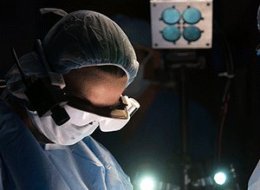
By Ben Gruber
St. Louis, Missouri – When Sandy Sagitto was diagnosed with breast cancer she was devastated.
“First thought is that I couldn’t believe that I drew that card from the deck. I had no risk factors going in, I had no family history. It wasn’t real for a while,” she said.
But reality set in fast when her doctors said they needed to remove the cancer forming in her body. Sagitto, 53, a neurosurgery nurse for the past 25 years, was open to the idea of participating in a clinical trial to test out a new technology that gives surgeons the ability to visualize cancer cells in real time while they operate.
“Wow, we have headed into the Superman realm. You have the x-ray vision,” she said.
It’s better than x-ray vision, according to Dr. Samuel Achilefu, a professor of radiology at Washington University, who developed the technology.
Achilefu says that in a conventional lumpectomy, a procedure to remove a portion of the breast to treat cancer, surgeons rely on scans taken before the operation to decide how much tissue to remove. He says differentiating between healthy cells and cancer cells is hard, which is why surgeons remove an excess amount of healthy tissue when operating, and even when erring on the side of caution, up to 25 percent of patients need a repeat procedure to remove more cancerous tissue.
“The primary goal of the technology is to make sure that the surgeon does not operate in the blind, it’s to make the cancer cells light up like Christmas trees,” said Achilefu.
The system works by first injecting the patient with a cancer-targeting dye that attaches to abnormal cells. Then a near infrared light is beamed on the target area which allows a surgeon wearing specialized glasses to see cancer cells glowing.
“What this does is conserve the healthy tissue and only go after the ones that are abnormal,” added. Achilefu.
Currently the cancer glasses are being tested on skin and breast cancer patients, but Dr. Achilefu says they could be used to visualize and remove a wide range of cancers. He says lighting up cancer means a brighter future for people diagnosed with the deadly disease.

